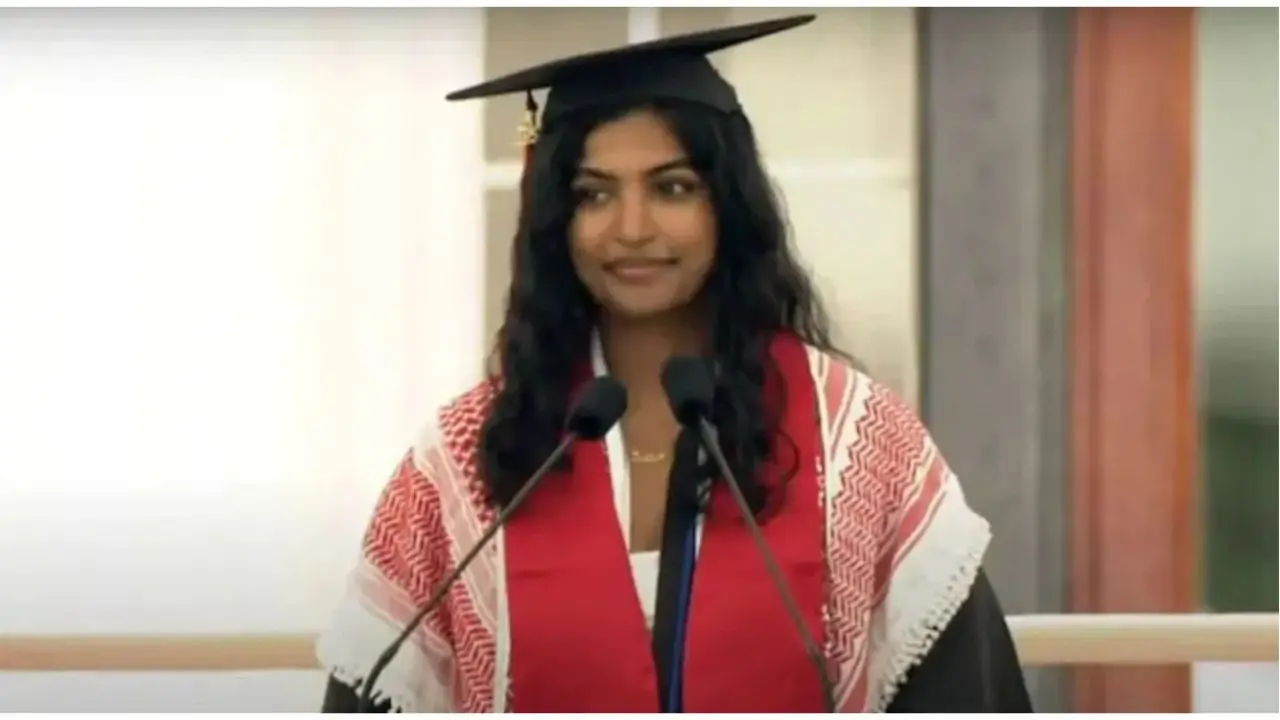
Megha Vemuri (File)
Megha Vemuri, an Indian-American student and the Class of 2025 president at the Massachusetts Institute of Technology (MIT), found herself at the center of a heated controversy after delivering a pro-Palestine speech during a commencement event on May 29, 2025. Her remarks, which criticized MIT’s research ties with the Israeli military and called for a free Palestine, led to her being barred from the undergraduate commencement ceremony the following day. The incident has ignited debates about free speech, academic freedom, and the role of political activism on university campuses.
Megha Vemuri, born to parents from Andhra Pradesh, India, and raised in the United States, is a distinguished MIT graduate with a Bachelor’s degree in Computer Science, Neuroscience, and Linguistics. She graduated from Alpharetta High School in Georgia and has been an active member of the MIT community, serving as the Class of 2025 president and a member of the class council. Vemuri’s academic pursuits extended beyond the classroom, as she worked as an undergraduate research assistant at the MIT Media Lab and the McGovern Institute for Brain Research. In 2019, she co-founded Forte Promotions, showcasing her entrepreneurial spirit. Her leadership and academic excellence earned her the honor of serving as marshal for MIT’s commencement, a role she was later denied due to her controversial speech. Vemuri’s LinkedIn profile highlights her commitment to blending technology and social impact, making her a prominent figure among her peers.
She condemned MIT’s research ties with the Israeli military, stating, “Israel’s assault on the Palestinian people is aided by our school.” She praised student activism, noting that MIT’s undergraduate and graduate unions had voted to sever ties with Israel and called for a permanent ceasefire in Gaza. Vemuri highlighted the destruction of Gaza’s universities, contrasting it with MIT’s graduation celebrations. Her remarks, which accused Israel of attempting to “wipe Palestine off the face of the earth,” drew cheers from supporters but criticism from others, including the MIT Jewish Alumni Alliance, which called it “Hamas-inspired propaganda.” MIT Chancellor Melissa Nobles cited a violation of the university’s “time, place, and manner” rules, banning Vemuri and her family from campus on May 30.
The decision to bar Vemuri sparked protests, with students chanting “Let Megha walk” during the undergraduate ceremony, briefly interrupting Chancellor Nobles’ speech. Vemuri defended her actions, arguing that her speech was not a protest but an exercise of free expression, and called the ban an “overreach.” The incident has fueled discussions about the limits of free speech on campuses, especially amid heightened tensions over the Israel-Palestine conflict. Some Jewish students and faculty, including doctoral student Talia Khan, criticized MIT’s leadership, with calls for President Sally Kornbluth’s resignation. Meanwhile, supporters lauded Vemuri’s courage, with posts on X praising her as a “fearless” advocate for Palestine. As U.S. campuses navigate rising activism, Vemuri’s case underscores the challenges of balancing free expression with institutional decorum, raising questions about the role of students in shaping global discourse.





Copyright © 2026 Top Indian News
